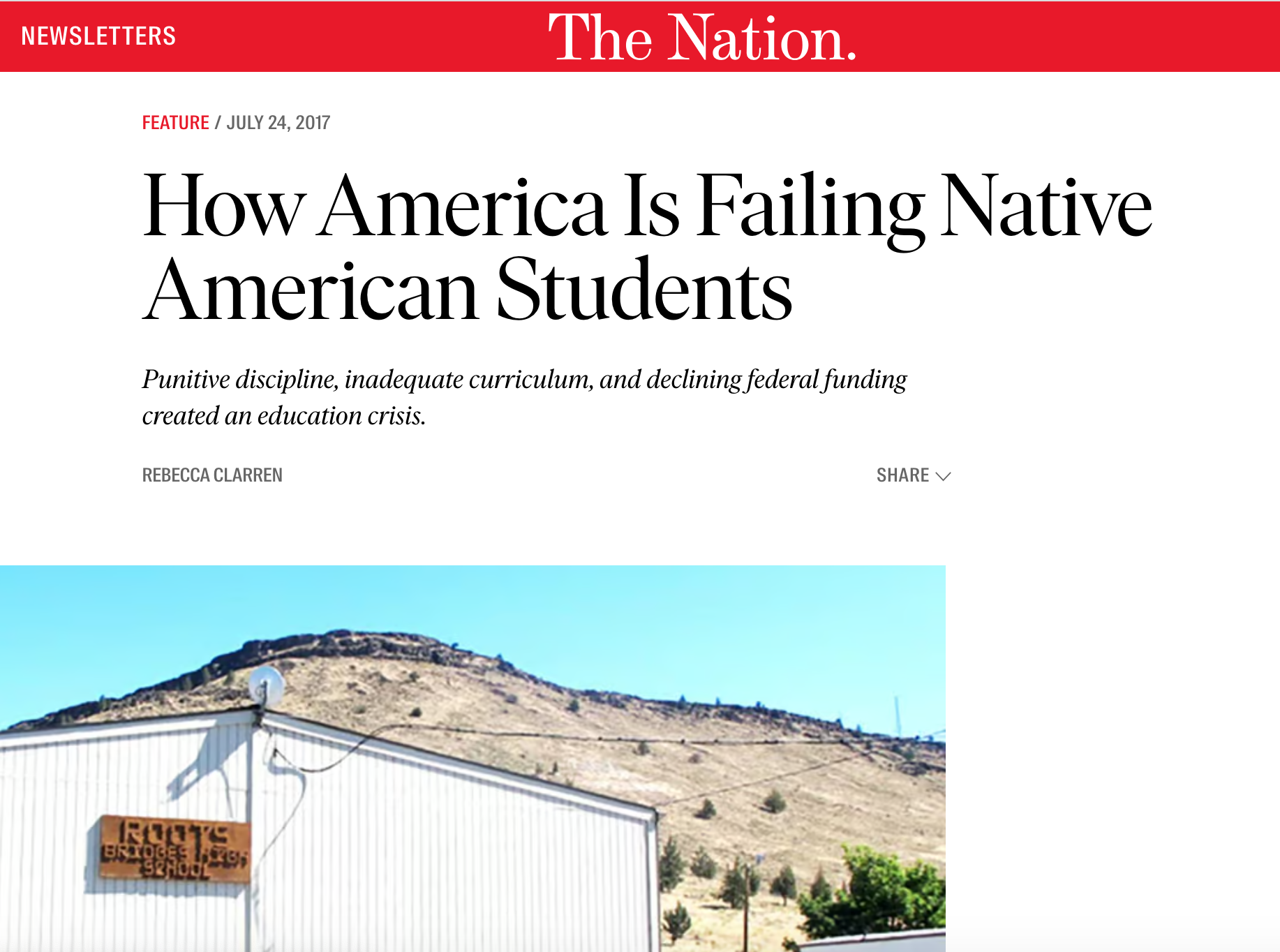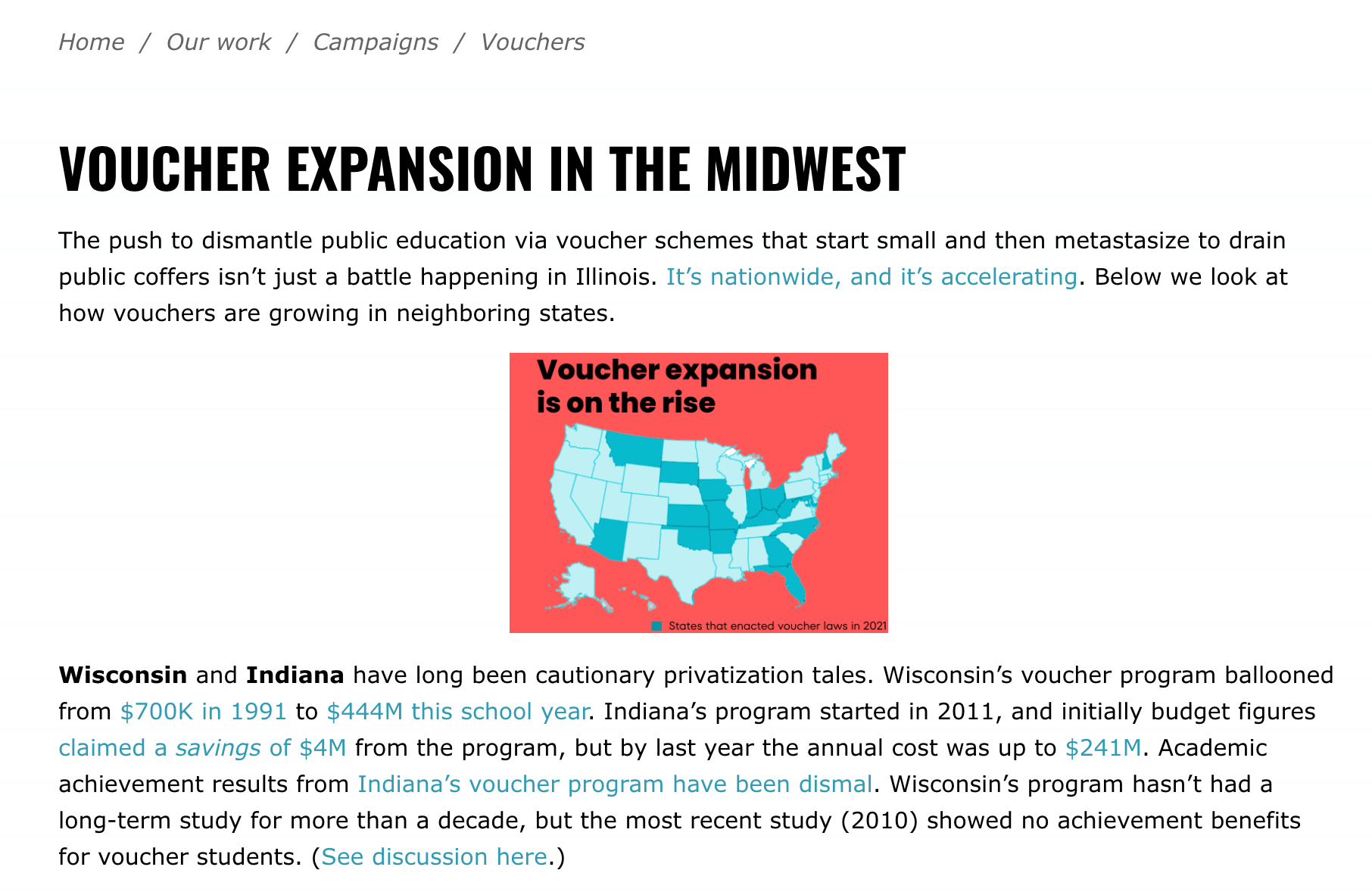ALL RESOURCES
FILTER BY TAG
Select a tag
- Academic performance
- Accessibility
- Accountability
- Advocates
- Article
- Bill analysis
- Bill tracker
- Blog post
- Civil rights
- Coalition building
- Community Schools
- Cost impact analysis
- Dark Money
- Disability
- Discrimination
- Drain funds from public education
- Education Savings Account (ESA)
- English language learners
- Fact sheet
- Graphic
- History
- Indigenous and Native Education
- Integration
- LGBTQ+
- Legislation
- Letter
- Litigation
- Messaging or talking points
- Model legislation
- News
- Parents
- Personal narrative
- Podcast
- Policy brief
- Policymakers
- Radio
- Religion
- Report
- Rural communities
- Segregation
- Separation of church and state
- Slides
- State Constitutional Right to Education
- Students
- Study
- Tax credit
- Testimony
- Toolkit or guide
- Transportation
- Types of vouchers
FILTER BY AUTHOR
Select an author
- Alec MacGillis
- Allen Pratt
- Associated Press
- Beth Lewis and Damaris Allen
- Bob Peterson
- Bruce Schreiner
- Carl Davis
- Casey Tolan, Rene Marsh and Nelli Black,
- Catherine Caruso
- CREED and HEAL NC
- Cyrus Driver and Mary Gonzalez
- Damaris Allen
- David Montgomery
- David Pepper
- Derek W. Black
- Donald Cohen
- Education Law Center Pennsylvania
- Education Voters of Pennsylvania
- Eli Hager
- Emily Walkenhorst
- Ethan Dewitt
- Families for Strong Public Schools
- Florida Policy Institute
- Florida Policy Institute and the Education Law Center
- Geoff Mulvihill
- Georgia Budget and Policy Institute
- Gov. Roy Cooper and Gov. Andy Beshear
- Griffin Coop and Benjamin Hardy
- Hilary Wething and Josh Bivens
- Howard Fischer
- Idaho Center for Fiscal Policy
- IDRA
- Illinois Families for Public Schools
- In the Public Interest
- Indiana Coalition for Public Education
- Jamie Klinenberg, Jon Valant, and Nicolas Zerbino
- Jasmine Bolton and April Callen
- Jason Bailey, Dustin Pugel, Joanna LeFebvre, and Pam Thomas
- Jeff Bryant
- Jessica Corbett
- Jim Collier
- Joanna LeFebvre
- Joe Dana
- Jon Valant and Nicolas Zerbino
- Joshua Cowen
- Kevin Welner
- Kris Nordstrom
- Kris Nordstrom, Phyllis Nunn
- Laura Pappano
- Laura Meckler and Michelle Boorstein
- Liz Canada
- Maurice Cunnningham
- Michelle Harven
- Missouri Budget Project
- National Coalition for Public Education
- National Education Association
- National Education Policy Center
- Network for Public Education
- New Jersey and National Organizations
- Nicole Stelle Garnett
- Nora De La Cour
- North Carolina Justice Center
- OpenSky Policy Institute
- Paige Masten
- Parents for Public Schools
- Pastors for Texas Children
- Patrick Darrington
- Paul Hammel
- Peter Greene
- Phil Williams
- Phoebe Petrovic
- Policy Matters Ohio
- Preston Green/Kevin Welner
- Public Funds Public Schools
- Public Funds Public Schools and Education Law Center
- Public Funds Public Schools and Idaho Center for Fiscal Policy
- Public Funds Public Schools, Education Law Center, Southern Poverty Law Center
- Public School Forum of North Carolina
- Rebecca Clarren
- Reg Ballantyne
- Sam Stockard
- Sasha Pudelski
- Save Our Schools Arizona
- Sherri Jones
- Southern Education Foundation
- State Rep. Glenn Rogers
- Stephen Caruso, Angela Couloumbis, and Katie Meyer
- Steve Suitts
- Support Our Schools Nebraska
- The Parents' Campaign Research and Education Fund
- Up North Podcast
- Wisconsin Public Education Network
- Yesica Balderrama
- Zack Carreon, WVXU, Kendall Crawford

How America Is Failing Native American Students
Inside a double-wide trailer on the Warm Springs reservation in central Oregon, nearly two dozen American Indian high-school students sit facing computers, teaching themselves math and history. Rain slaps the roof. Ear buds dangle from one girl’s left ear. Two more students whisper, sharing a joke. Still another student, his face set in a serious expression, stares at the screen before him. The one teacher in the room previously taught third grade; he’s certified to teach high-school continuing education and agricultural science. Nearly all of the young people who study in this trailer—officially called the Bridges Career and Technical High School at Warm Springs—are Native Americans.

School Vouchers Are Just Code for ‘Segregation Forever’
Today advocates of “school choice” routinely use the language of civil rights to argue that federal and state governments should finance largely unregulated private schools through the use of vouchers. These are the same type of vouchers that were the essential tools of Southern segregationists who fought and obstructed public school desegregation after the U. S. Supreme Court’s decision in Brown v. Board of Education in 1954. How has the nation arrived at this point?

Vouchers Forum 4.25.23
Illinois Families for Public Schools, the Illinois Education Association, the Illinois Federation of Teachers and the League of Women Voters of Illinois held a virtual forum on Tuesday April 25, 2023, "What You Need to Know about Invest in Kids: Illinois’ Tax Credit Voucher Program."

Vouchers Fund Discrimination
Public schools in Illinois can't discriminate on the basis of disability status, gender identity, sexual orientation, language, pregnancy or parenting status, marital status, or religion. But under the Invest in Kids voucher program, public dollars are now going to private schools in Illinois, many of which do discriminate against students in all these protected categories.

Who Supports Illinois’ Invest In Kids Voucher Program?
Voucher programs around the country—whether in the form of traditional vouchers, education savings accounts (ESAs),or tax credit scholarships—are supported by well funded and organized groups. These include: Americans for Prosperity (the Koch brothers’ 501c4), the American Legislative Education Council (ALEC), the American Federation for Children (Betsy DeVos’ 501c4), Moms for Liberty and the Heritage Foundation, among others.
What do these organizations have in common? They work openly to discredit public schools and push a privatization agenda, using the slogans of school choice, education freedom and parent rights. Many of them were on the ground working on the April 2023 school board elections in Illinois.

Voucher Expansion in the Midwest
The push to dismantle public education via voucher schemes that start small and then metastasize to drain public coffers isn’t just a battle happening in Illinois. It’s nationwide, and it’s accelerating.

Voucher Web page
This web page from Illinois Families for Public Schools includes blog posts covering school voucher programs in Illinois.

Game Over for School Vouchers in Illinois!
In 2017, as a result of a backroom deal between then Governor Rauner, legislative leaders and the Archbishop of the Archdiocese of Chicago, the IL General Assembly created a K-12 voucher program for Illinois in the form of a tax credit scholarship scheme. Known as the Invest in Kids Act, the law allows up to $75 million in tax revenue to be diverted to private schools each year. More than $250 million state dollars have now been siphoned off to private schools in our state.
This program was intended to last for five years and to sunset after the 2022-2023 school year. It was extended for one additional school year already. Voucher supporters and school privatizers want it to be made permanent and expand!

#SCHOOLVOUCHER SCAM$
Our Voucher School Scam$ page, which we began in September of 2023 in response to the recent flood of irresponsible universal voucher programs includes a sorting feature that allows you to search charter scandals by state and by 12 categories. You can also search by keyword. Just use the ‘X’ to clear search terms and return to the full list of scandals.

Scotland County public schools deserve better than voucher program
A looming education bill in Raleigh will harm public schools in the Scotland County area if it becomes law. Senate Bill 406/House Bill 823 would triple the size of the state’s Opportunity Scholarship private school voucher program by opening the program to wealthy families whose kids are already enrolled in private schools and increasing the maximum voucher size. The bill would negatively impact public schools across the state but will have a particularly negative impact on rural schools.

Ensuring Fair School Funding for All Students.
Policies that base funding on community wealth and ignore the real costs of educating all students hurt everyone, especially students of color, students from families with limited incomes, and students who require additional programs, supports and services.

Vouchers and Other Diversions of Public Funds to Private Schools
Vouchers are state-funded certificates that are used to pay tuition to private schools. Mississippians have been so opposed to using taxpayer dollars to fund private schools that our constitution bans these voucher payments. Savvy folks who have long sought to privatize our public schools now are attempting to circumvent the constitution – and the will of the people – by using tax credits and education savings accounts to funnel state tax dollars to private schools.
The most recent research on the academic impact of private school vouchers finds that voucher students experience significant losses in achievement. Prior research showed that gains in achievement were about the same for low income students receiving vouchers as they are for comparable public school students.

Fund what works: Public dollars for public schools
Regardless of race, neighborhood, or how much money is in their parents’ bank account, every child should be able to attend an excellent school that has everything they need to learn and grow. Every dollar spent on vouchers makes this vision less achievable. Vouchers take public money and give it to private schools, with real consequences for the 90% of our kids who attend Ohio's public schools.

PFPS Webinar Series
Public Funds Public Schools lists their series of webinars on school voucher programs with descriptions and links.

SOS Arizona Network Blog
This web page from Save Our Schools Arizona is includes blogs on Arizona’s voucher program.

PFPS Interview with Richland County Public Education Partners
Robert Lominack, Executive Director of Richland County Public Education Partners (RCPEP), and Debbie Billings, a parent and public school advocate in South Carolina affiliated with RCPEP, spoke with Nicole Ciullo, Research & Policy Associate at Education Law Center. Founded in 2018, RCPEP works to improve Richland County public schools by supporting and developing innovative initiatives that assist teachers, students, and families. The interview, which was conducted earlier in the legislative session, has been edited for length and clarity.

The PFPS Interview: Reverend Johnson of Pastors for Texas Children
Reverend Charles Foster Johnson, co-pastor of Bread, in Fort Worth, Texas; Founder and Executive Director of Pastors for Texas Children, a faith-based advocacy group that works to promote and advance public schools in Texas; and head of the national Pastors for Children organization spoke to Jessica Levin, Public Funds Public Schools Director. The interview has been edited for length and clarity.

The PFPS Interview: Molly Sweeney, Owen Goslin, and Arlyssa Heard from Michigan’s 482 Forward
PFPS continues to showcase the work of public education advocates across the country in the latest installment of the PFPS interview series. These interviews offer advice and insights for others fighting private school voucher proposals. Given the large number of voucher bills already introduced in the 2023 legislative session, sharing knowledge and inspiration from successful state and local organizations opposing these policies is more crucial than ever. This interview highlights the efforts of dedicated public school advocates in Betsy DeVos’s home state of Michigan, which remains voucher free despite powerful pro-privatization forces once again focusing their energies on establishing a voucher program in the Great Lakes State last year.

Mississippi Constitution: No Public Funds for Private Schools
The Mississippi Constitution is clear: taxpayer dollars may not be appropriated for private schools.
The authors of the State Constitution understood that strong public schools are unique in their contribution to the wellbeing of our communities and our state – and that the greatest threat to this vital common good is the siphoning of public funds to subsidize the private education of a few, creating a system of unequal schools that would divide and weaken our state.
